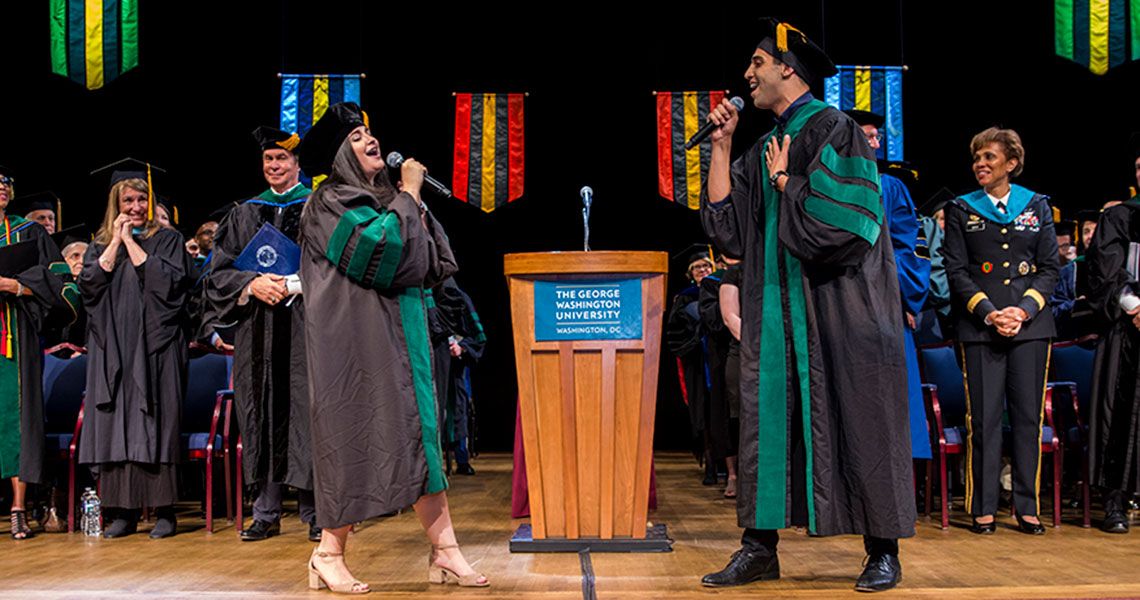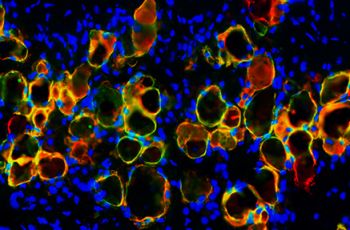George Washington University (GW) School of Medicine and Health Sciences graduates had the “time of their lives” at the 2017 M.D. Diploma Ceremony on May 21, thanks to a couple of their more musically inclined classmates, as well as the support from their family, friends, teachers, and mentors.
The event started out as GW M.D. ceremonies often do, with the sound of bagpipes filling Lisner Auditorium and faculty and the Class of 2017 filing in, but it quickly turned into a party when fourth-year students Arielle H. Katcher, M.D., and Sean Yasha Saadat, M.D., microphones in hand, belted out the lyrics to “(I’ve Had) the Time of My Life.”
After the performance, which had the auditorium crowd singing and clapping along, Jeffrey S. Akman, M.D. ’81, RESD ’85, vice president for health affairs, Walter A. Bloedorn Professor of Administrative Medicine, and dean of the GW School of Medicine and Health Sciences (SMHS), thanked the students for getting the crowd “into the mood.”
Keynote guest speaker Lieutenant General Nadja Y. West, M.D. ’88, 44th Army Surgeon General and Commanding General for the United States Army Medical Command, also joked that the song “was so motivating” it made her want to jump up and do pushups.
West reminded the soon-to-be doctors of the real reason they were there: to take the momentous step of becoming a clinician. “What a great and noble profession that it is. That of a healer, and a comforter, and a universal symbol of hope,” she said. “It’s a profession that should not be taken lightly, and a profession that must be treasured and nurtured throughout one’s entire life.”
For West, who is the first black U.S. Army Surgeon General and is the highest-ranking black woman in U.S. Army history, that same momentous step also started here. “West Point taught me about the profession of arms … but GW taught me about the profession of medicine. GW gave me the skills to become a compassionate healer, someone who can provide hope to others. Little did I know what possibilities were in store for me when I was sitting in lecture halls,” she said.
“As you transition to the next phase of your studies — yes, it’s not over, more studies, it never ends — I’ll leave you with a bit of advice on the importance of our profession,” West said.
While it’s easy to get bogged down in the challenges of all the things a doctor has to do, she told the students, it’s important to never forget the things you get to do: share in the intimate details of another person’s life, relieve suffering, provide hope, and make a difference.
“As you put on the cloth of your profession and sign your name followed by your credentials for the very first time, make a point to remember this day,” she concluded. “Do not let it become routine or mundane, because it can. … I challenge you to use the foundation you cultivated here and become the new generation that will lead the transformation of health care into a new era that will improve the lives of people all around the globe.”
Following the presentation and hooding of the graduates, Fatima Aly Hassan Daoud, M.D., gave the class address.
“What kind of doctor do you want to be?” she asked her classmates. “Not specialty, but what kind of doctor do you want to be? Will you advocate for the marginalized? Will you advocate for those who prey on the vulnerable? Will you empower those who have been victims?”
“Today I’m humbled to be in the company of some of the finest people I’ve had the privilege to learn alongside of, and I’m sure I’m not alone when I say I can’t wait to see what the future holds for the Class of 2017,” she said.
To close out the ceremony, before the recitation of the Hippocratic Oath, Akman relayed the importance of truth in medicine and in the health professions.
He spoke about the 2016 Oxford English Dictionary Word of the Year for 2016: post-truth, which is defined as relating to circumstances in which objective facts are less influential in shaping opinion than appeals to emotion and personal beliefs. “Consider how living in a post-truth world affects medicine,” he said. “Despite what you see and hear in the post-truth world, you are nothing without your integrity and honor.”
“And so, doctors, I charge you to seek truth and pursue it steadily. … I charge you to sustain the call to service and advocacy that brought you to GW for medical school,” he said. “There’s so much that needs to be done in our communities, in our country, and around the world. Strive to be the physician citizen, the physician officer, or the physician activist that will make an impact beyond the exam room.”



